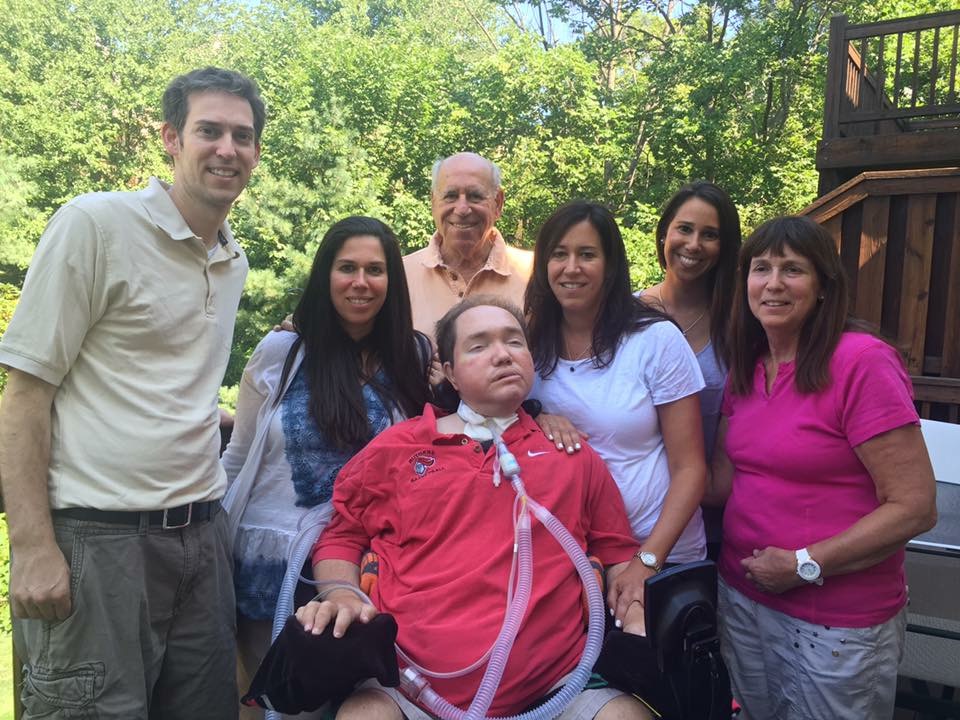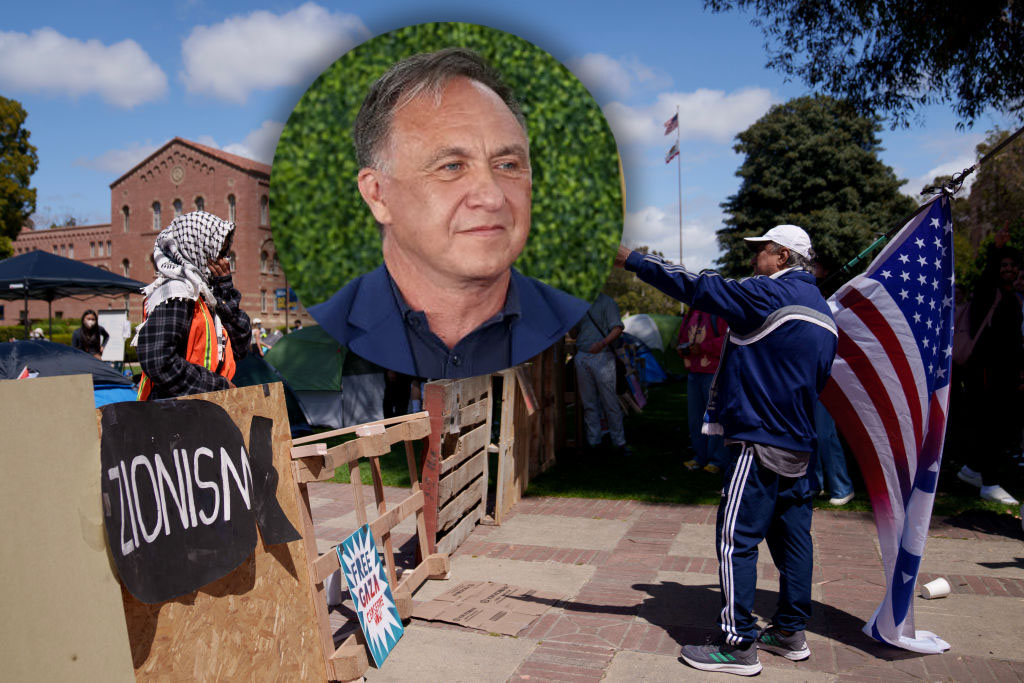 Eyal Sherman, center, with family (Photo courtesy of Rabbi Erez Sherman)
Eyal Sherman, center, with family (Photo courtesy of Rabbi Erez Sherman) I received an note from a rabbinic e-mail list last month that read, “Please send in your names for notable deaths in 5777.” Carrie Fischer, Sen. John Glenn and even Hugh Hefner made the list.
I responded publicly, “I have learned that every life is a notable death.”
I had been officially an avel, a mourner, for 24 hours. My brother, Eyal David Sherman, 36 years old, passed away, on Sept. 24, my birthday. He had been a quadriplegic for the last 32 years, after suffering a brain stem tumor and subsequent stroke at the age of 4.
Just two days prior, I stood with my congregants of Sinai Temple, and recited the Unetaneh Tokef prayer, who should live and who shall die. Each year, the absence of those lost makes their presence more noticeable. These words were now my reality.
My brother accomplished more in his 36 years than most of us do in our entire lives. He graduated kindergarten, high school and college, even when the doctors told them he would not live past his fifth birthday. He became an accomplished artist, drawing and painting with a mouthstick wedged between his lips.
My father, my sister and my wife are all rabbis, but it was Eyal who became our rebbe.
Our tradition teaches us about shevirat kelim, the breaking of the vessels. The vessels that contained God’s light could not contain them and were shattered. We must put them back together.
Eyal’s death broke the vessel, but the light has emanated out. During this heartbreak, we have also experienced a tikkun, a repair, for as we continue to share Eyal’s story, so many have shared their stories with us.
During shivah, we were honored to host Dr. Mark Helfaer, an ICU attending at Children’s Hospital of Philadelphia, who saved Eyal’s life multiple times. Born in Niagara Falls, Mark was orphaned at the age of 10. He was taken in by his uncle and aunt.
Unfortunately, Mark never celebrated his bar mitzvah, and he carried that resentment through his life. This year, at the age of 60, he marked that rite of passage. My father, Rabbi Charles Sherman, always one to throw in a joke, asked, “Mark, what was the theme of your party?”
His response: “Rabbi … the theme was gratitude.”
Today, Dr. Helfaer, so vibrant and robust and brilliant, my brother’s personal miracle maker, suffers from multiple sclerosis. He walks with a cane and slurs his speech. At shivah, he explained that Eyal was one of his most intellectually stimulating cases, and Eyal’s story inspires him to find meaning in his own battle with a disease that has stopped him from working, but has given him the gift of gratitude.
Yes, gratitude is the ability to say thank you. But gratitude is the gift to acknowledge the blessings around you. Gratitude is the gift of being noticed … gratitude is the gift of a notable life.
For 36 years, Eyal led a notable life. Very few individuals could be so inspirational without saying a word. Eyal was the definition of the kol demama daka, the still silent voice whose actions blasted like the shofar. Just scroll down Facebook and read the thousands of tributes of those — many who never met Eyal in person — have been motivated to make this world a better place.
Every Shabbat, Eyal had an assigned part of the birkat hamazon. He would silently mouth baruch atah adonai boneh yerushalayim, asking God to rebuild Jerusalem. Eyal is the builder of our spiritual Jerusalems.
While Eyal was a miracle, the most miraculous part was that Eyal was simply my brother. A lover of Syracuse University basketball, a passionate sports fan, an unbelievable artist and a lover of family, our righteous parents turned the extraordinary into the ordinary.
Thankfully, it was this ordinary brother that inspired every sermon I crafted. In fact, as I dated my now wife, Rabbi Nicole Guzik, the first gift I gave her was the transcript of my father’s book about the story of Eyal, “The Broken and the Whole.”
Several years ago, my father and I toured the country telling Eyal’s story. The most common question was, “Is Eyal a burden?” They were in awe, as we answered, “Eyal is a blessing.”
Nothing for us will ever be the same with Eyal’s death. He is and will always be my tzadik, my righteous brother. Yet, we know that each and every day on this earth will be guided by Eyal’s still small voice, guiding us on the right path.
Donations can be made to:
The Eyal Sherman Foundation
c/o Estate Bookkeeping
Cozen O’Connor
1650 Market St, Suite #2800
Philadelphia, PA, 19103
Rabbi Erez Sherman is a rabbi at Sinai Temple.





















 More news and opinions than at a Shabbat dinner, right in your inbox.
More news and opinions than at a Shabbat dinner, right in your inbox.